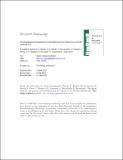The physiological consequences of crib-biting in horses in response to an ACTH challenge test
Abstract
Stereotypies are repetitive and relatively invariant patterns of behavior, which are observed in a wide range of species in captivity. Stereotypic behavior occurs when environmental demands produce a physiological response that, if sustained for an extended period, exceeds the natural physiological regulatory capacity of the organism, particularly in situations that include unpredictability and uncontrollability. One hypothesis is that stereotypic behavior functions to cope with stressful environments, but the existing evidence is contradictory. To address the coping hypothesis of stereotypies, we triggered physiological reactions in 22 horses affected by stereotypic behavior (crib-biters) and 21 non-crib-biters (controls), using an ACTH challenge test. Following administration of an ACTH injection, we measured saliva cortisol every 30 min and heart rate (HR) continuously for a period of 3 h. We did not find any differences in HR or HR variability between the two groups, but crib-biters had significantly higher cortisol responses than controls (mean ± SD: CB, 5.84 ± 2.62 ng/ml, C, 4.76 ± 3.04 ng/ml). Moreover, crib-biters that did not perform the stereotypic behavior during the 3- h test period (Group B) had significantly higher cortisol levels than controls, which was not the case of crib-biters showing stereotypic behavior (Group A) (A, 5.58 ± 2.69 ng/ml; B, 6.44 ± 2.38 ng/ml). Our results suggest that crib-biting is a coping strategy that helps stereotypic individuals to reduce cortisol levels caused by stressful situations. We conclude that preventing stereotypic horses from crib-biting could be an inappropriate strategy to control this abnormal behavior, as it prevents individuals from coping with situations that they perceive as stressful.
Citation
Freymond , S B , Bardou , D , Briefer , E F , Bruckmaier , R , Fouche , N , Fleury , J , Maigrot , A -L , Ramseyer , A , Zuberbuehler , K & Bachmann , I 2015 , ' The physiological consequences of crib-biting in horses in response to an ACTH challenge test ' , Physiology & Behavior , vol. 151 , pp. 121-128 . https://doi.org/10.1016/j.physbeh.2015.07.015
Publication
Physiology & Behavior
Status
Peer reviewed
ISSN
0031-9384Type
Journal article
Collections
Items in the St Andrews Research Repository are protected by copyright, with all rights reserved, unless otherwise indicated.

